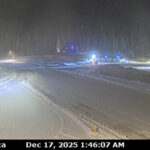Home »

CBFWCP should be stronger: Bennett

Kootenay East MLA Bill Bennett believes changes to BC Hydro’s Columbia Basin Fish and Wildlife Compensation Program (CBFWCP) Steering Committee will make it a stronger program.
And thanks to concerns raised to him by constituents and action taken in Victoria, conservation efforts won’t be impacted, Bennett said Feb. 28 in the Legislature.
“In October a friend of mine, Dave White from the Canal Flats Wilderness Club and a former president of the B.C. Wildlife Federation, sent me an e-mail saying that B.C. Hydro had laid-off all of their staff in their Columbia Basin Fish and Wildlife Compensation Program. BC Hydro’s announcement sent shockwaves through the Kootenay conservation community, where fish and wildlife is a predominant shared cultural value. Nobody should ever mess with our fish and wildlife in the Kootenays,” Bennett stated.
“Since 1988 B.C. Hydro has invested more than $100 million in fish and wildlife and associated habitats in three regional fish and wildlife compensation programs that they have in the province. The three programs are delivered through a joint partnership between B.C. Hydro, the province, and Fisheries and Oceans Canada.
“The announcement in the fall was that a new model for delivery of this program in the Columbia would be adopted by BC Hydro. There would be one staff member, and proponent-driven projects would be awarded dollars through an administrator. The theory was that delivering the program through contractors would allow more money to flow to projects versus administrative tasks. The problem with the theory was that the corporation had neglected to talk to anybody in the region and ask them what they thought. The people of the region just don’t take that kindly to those kinds of surprises,” he told the Legislature.
“So here we are five months later, and I am happy to report that due to the commitment made to this file by the Ministers of Energy, of Forests, Lands and Natural Resource Operations, and of Environment, a comprehensive series of community engagement meetings have been set up — they have already started — by B.C. Hydro across the whole region. Empty seats for the public and First Nations on the Columbia Basin Fish and Wildlife Compensation Steering Committee will soon be filled. The steering committee will be provided an opportunity to work directly with the provincial policy committee, which is something they previously didn’t have,” Bennett said, adding, “The two remaining gaps are, one, to create some kind of independent oversight for the next year as this new delivery model is being created from the ashes of the old one, and secondly, to ensure that the corporate memory and the expertise of the six dismissed employees are not lost to the program. If these two elements are adopted, it is my view that we’ll end up with a strengthened fish and wildlife compensation program in the Columbia, and that would be a very good thing.”
In October 2011 BC Hydro announced a restructuring of its environmental department that reduced the number of staff supporting the Fish and Wildlife Compensation Program in the Columbia Basin (Nelson and Cranbrook), the Peace region (Prince George) and in Burnaby. There was no change to funding levels (approximately $8 million per year).
The model was in place to provide regional programs to conserve and restore fish and wildlife habitats negatively impacted by dams and energy projects.
Funds are used to conserve and restore fish and wildlife habitats affected by the creation of BC Hydro dams. BC Hydro funds the program and partners with the Provincial Government and the Department of Fisheries and Oceans to manage the conservation activities.
Since 1988, BC Hydro has invested over $100 million to three regional compensation programs for more than 700 projects.
The changes announced in October 2011 meant eleven program staff would be laid off by the end of the fiscal year (March 2012). Some affected staff will find work elsewhere in BC Hydro or with the province.
e-KNOW







